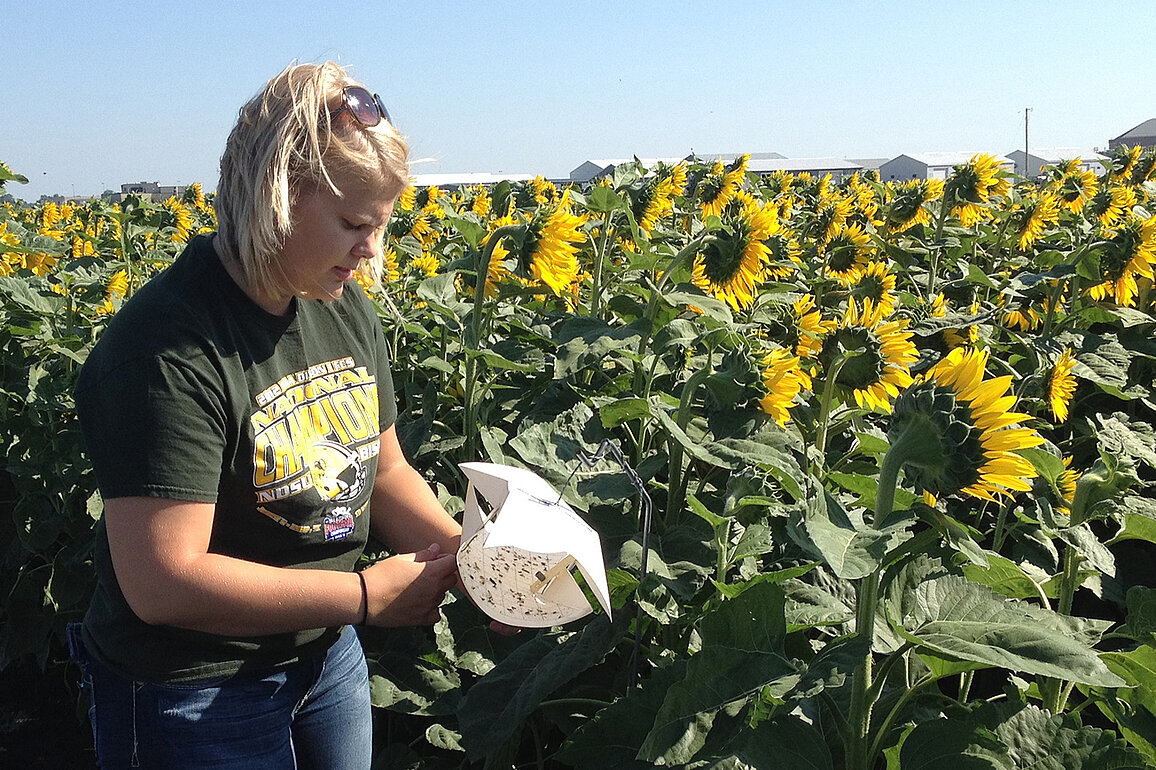NDSU Extension IPM Program Combats Crop Insect Pests and Diseases

Each year, NDSU-trained crop scouts survey fields for insect pests and diseases that threaten North Dakota’s crops.
The IPM scouts’ work is the heart of NDSU’s Integrated Pest Management (IPM) crop survey program, says Patrick Beauzay, NDSU research specialist and IPM coordinator.
The scouts collect information to give Extension agents and those in agriculture a weekly snapshot of the presence and prevalence of insect pests and diseases, and potential economic damage they might cause. Once producers know a disease or insect pest is in their area, they can monitor their fields and take steps to manage it, says Andrew Friskop, NDSU Extension plant pathologist.
Janet Knodel, lead principal investigator of the IPM Program of North Dakota and NDSU Extension entomologist, says the survey data has other long-term benefits, including:
Providing seasonal and long-term information on pest presence, distribution and severity
Detecting the early development of pesticide resistance
Surveying for new invasive insect pests or diseases
Improving exports of North Dakota crops through negative data for invasive insect pests and diseases
Spotting relationships between pest populations and environmental factors for improved risk forecasting models
Demonstrating the impact of IPM practices on the occurrence of pests
Identifying areas for additional crop research
Pinpointing the need for educational programs on improved strategies for insect and disease pest management
NDSU’s IPM survey began in 1988 with one IPM scout to identify diseases in wheat and barley in eastern North Dakota. In 2021, eight IPM scouts surveyed a total of 678 wheat fields (winter wheat, hard red spring wheat, durum wheat) and 119 barley fields for 18 diseases and six insect pests throughout North Dakota.
IPM scouts also surveyed a total of 539 soybean fields and 299 sunflower fields during the 2021 growing season. Pheromone traps are used by the IPM scouts to monitor for key insect pests as well as invasive insect pests in North Dakota crops, such as banded sunflower moth, wheat midge, common armyworm and the invasive old-world bollworm.
“We use the scouting data to create survey maps showing where insects and diseases are detected and the severity of the infestations, plus charts and tables to indicate trends and estimate potential yield losses,” says Samuel Markell, Extension plant pathologist.
Throughout the growing season, real time data is disseminated through NDSU’s IPM website, the NDSU Extension Crop and Pest Report, county Extension Ag Alert newsletters, NDSU’s Ag Hub website and at meetings and field days.
The IPM Crop Survey Program is made possible through a grant from the USDA National Institute of Food and Agriculture, Crop Protection and Pest Management Program – Extension Implementation Program (award number 2021-70006-35330) and the Cooperative Agricultural Pest Survey Program of the North Dakota Department of Agriculture.
FOR MORE INFORMATION:
https://www.ndsu.edu/agriculture/ag-hub/ag-topics/crop-production/crop-pest-report/entomology
Janet Knodel, 701-231-7915, janet.knodel@ndsu.edu
Patrick Beauzay, 701-231-7064, patrick.beauzay@ndsu.edu
Andrew Friskop, 701-231-7627, andrew.j.friskop@ndsu.edu
Samuel Markell, 701-231-8362, samuel.markell@ndsu.edu


